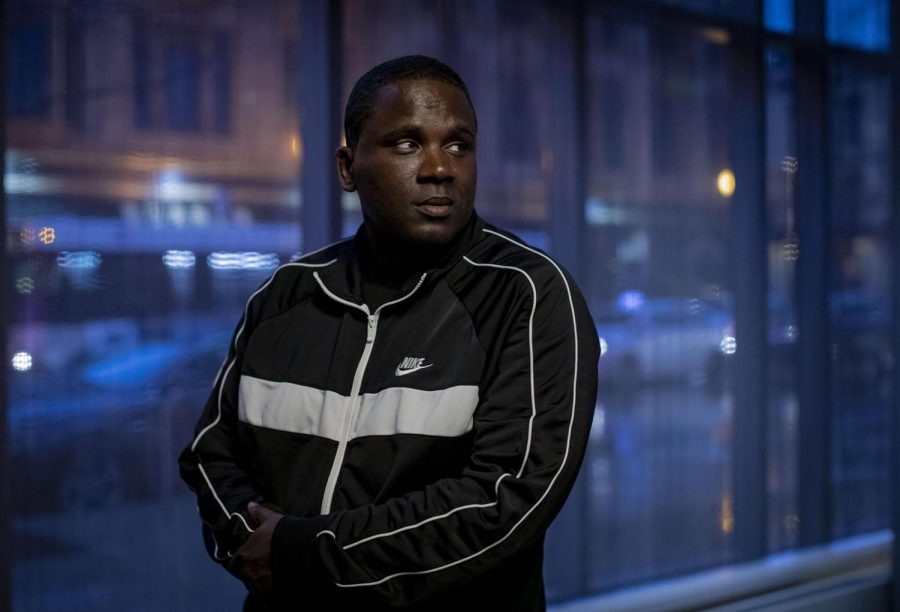Former IDOC inmate Anthony Gay talks solitary confinement at NPEP Transforming Criminal Justice roundtable
Brian Cassella/Chicago Tribune/TNS
Anthony Gay, a former inmate in the Illinois Department of Corrections.
October 13, 2020
Content warning: This story contains mentions of self-harm.
Anthony Gay, a former inmate in the Illinois Department of Corrections, recounted the isolation he felt during his 22 years in solitary confinement during Northwestern Prison Education Program’s roundtable Tuesday.
The discussion on solitary confinement featured attorney Maggie Filler and Daniel Greenfield, a Supreme Court and Appellate Counsel, both with the Roderick & Solange MacArthur Justice Center.
According to the Association of State Correctional Administrators and Yale Law School, an estimated 80,000 people are currently held in solitary confinement in U.S. prisons, not including those in county jails, juvenile facilities or immigration and military detention centers.
Solitary confinement also sets prisoners up for failure upon reentry, Greenfield said. There are no programs for reintegration to society and even after being released from solitary confinement, many people suffer from PTSD and struggle with social interactions.
“We’ve created this alternative society that exists out of sight and out of mind with minimal oversight,” Greenfield said.
Gay was introduced to this “alternative society” at 12 years old. After a fight with another boy who accused him of stealing a hat and a $1 bill, he said a detective interrogated and coerced him into pleading guilty for robbery instead of battery, resulting in a longer sentence.
Once in prison, a fight put him into solitary confinement and his decades-long struggle with mental illness began.
Gay bared his scars at the roundtable when he said he had to self-harm in order to survive. He said being able to interact with nurses and correctional officers, even in those extreme circumstances gave him the social stimulation he needed to live.
“I lost my social identity,” Gay said. “I had no one to say ‘Anthony, you’re a person.’”
Many incarcerated people Gay knows would self-mutilate, make a fake weapon or pretend they were going to escape, knowing they would get years added onto their sentence, in order to get out of solitary confinement even for a short amount of time. He grew somber as he described multiple other friends who have “deteriorated” in solitary confinement.
As his behavior worsened with time, Gay said he was prosecuted and had years added on to his sentence instead of getting treatment.
“Their response was, ‘You’re going to die in solitary confinement for your mental illness,’” Gay said.
The Prison Litigation Reform Act enacted in 1996, Filler said, makes it almost impossible for incarcerated people to seek better conditions through lawsuits. The physical injury requirement under the act says a prisoner cannot file a lawsuit for mental or emotional injury unless they can show physical injury as well.
New legislation out of the Illinois General Assembly aims to limit solitary confinement in the IDOC. House Bill 182 sponsored by State Rep. La Shawn Ford (D-Chicago), called the Anthony Gay Isolated Confinement Restriction Act, would limit solitary confinement to 10 consecutive days and no more than 10 days in a six-month period in the IDOC. It also ensures that inmates would have access to a long list of activities including job assignments, educational classes and group therapy.
Solitary confinement has been highly contested recently among policymakers and criminal justice experts because of the serious mental and physical effects it has on inmates. Filler said effects range from the psychological including depression, hallucinations and paranoia to the physiological, including malnutrition and death.
If incarcerated people are allowed to leave the cell for an hour a day for recreation, they are subject to a strip search which discourages many people from using that time.
“People really don’t have a sense of how dehumanizing even general population prisons are,” Filler said. “Our society’s current response to issues is just more prison.”
Email: [email protected]
Twitter: @samanthaagu1lar
Related Stories:
— NPEP hosts second roundtable in “Race, Racism, and Policing” series
— Local academics, Evanston officials discuss race and policing in virtual roundtable
— Students call on University to divest from police forces and invest in Black communities


